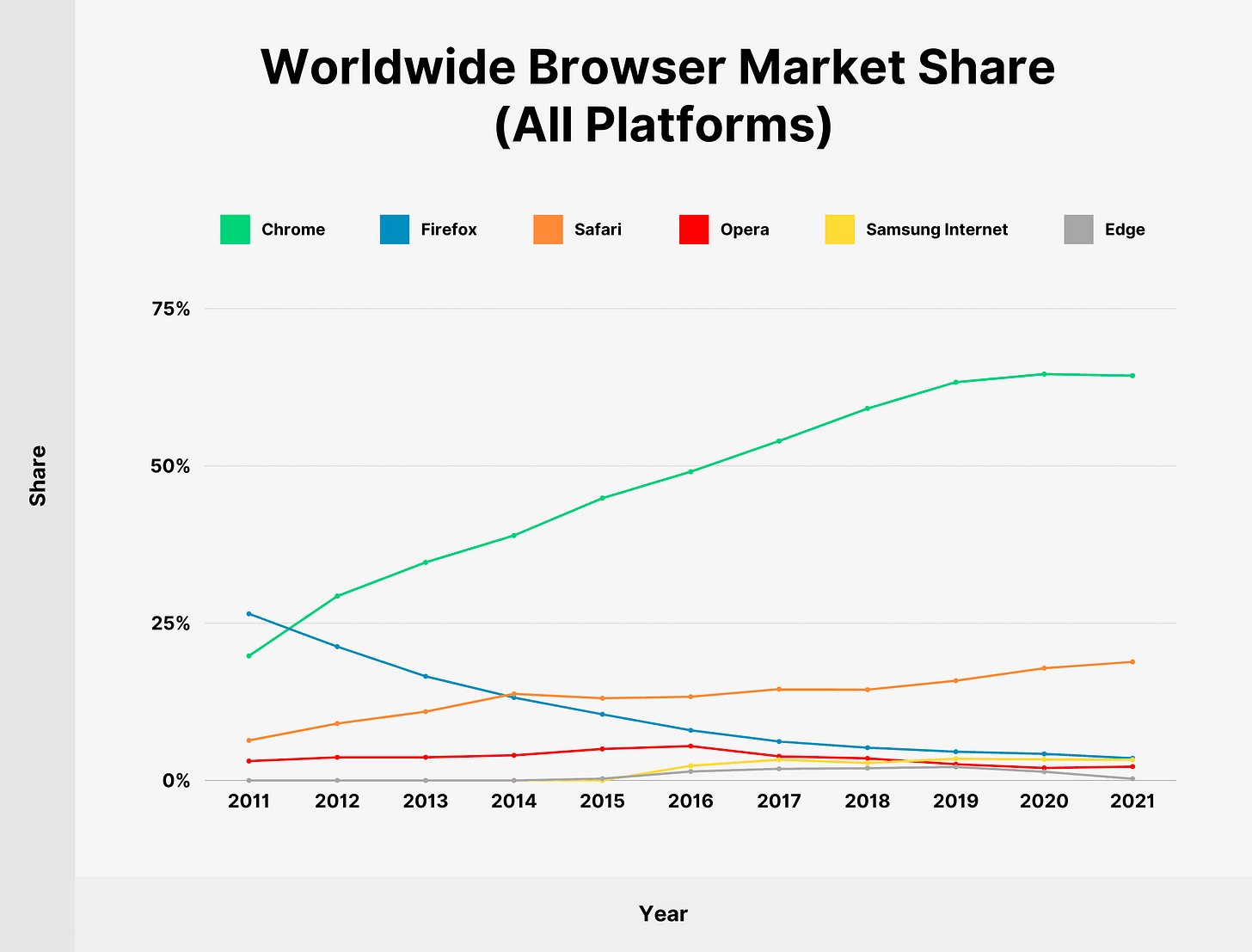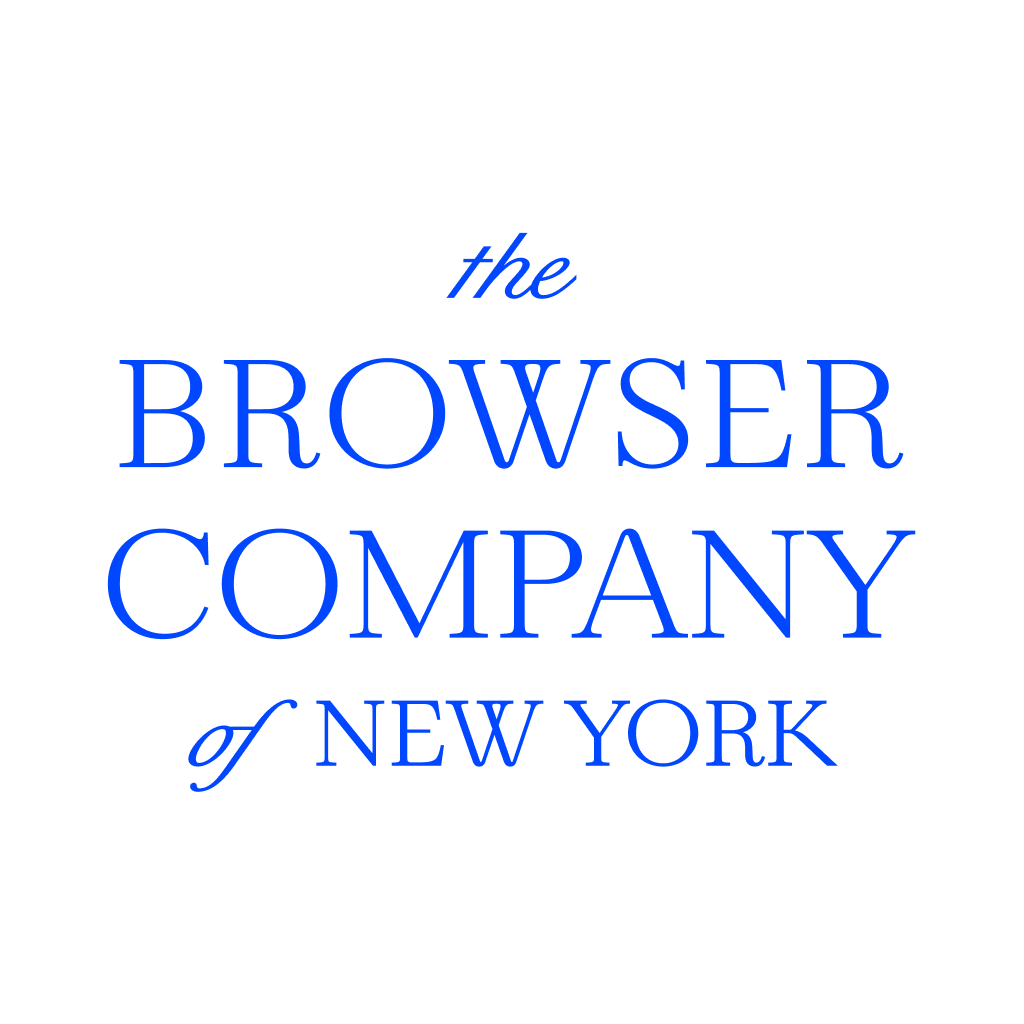After writing The Promise of Stripe Press, I began to wonder - what other companies had captured the zeitgeist like Stripe Press? I was at a loss for a long time, but eventually realized that the answer was literally staring me in the face, for multiple hours each day: The Browser Company.
I first downloaded Arc, The Browser Company’s browser product, in July 2022. At the time, I didn’t find it to be a 10x experience, and grappled with some bugs, so I went back to using Chrome. In May 2023, I decided to try Arc again, after a few colleagues raved about its elegance, quirkiness, and workflow boosts.
This post will cover some product features, but more importantly, it covers the strategy and power behind The Browser Company. It is the third in series on best in class companies focused on delightful digital user experiences: Stripe, Felt, and now, The Browser Company. It covers why, despite having 0% market share today, The Browser Company has a fighting chance to challenge incumbents’ browser products.
Google Chrome
Chrome dominates the browser market. It is stable, performant, and can run on your laptop or phone. Chromium is a free and open source project created by Google, that underpins Chrome and many browsers (Microsoft Edge, Brave, Arc by The Browser Company, and others).
What is The Browser Company?
User-Obsessed: The Browser Company treats the browser like a consumer product. Other browsers have the market cornered in making the browser accessible and interesting to developers and technical folks; the Browser Company believes non-technical users are also interested in the intricacies of the browsing experience (see release notes).
The Internet Computer: The Browser Company is creating an “internet computer.” Users can access their online lives from any device. This means a portable, unified browsing experience. No more emailing links from your phone, to your computer. No need to use different browsers to manage different parts of your life.
Marketing & Growth: The company has an active YouTube presence, where they walk users through new features and shortcuts, a newsletter:
, and shares (relatable and tactical) release notes. The company quantifies product stickiness by measuring how many users are using the product at least 5/7 days a week, a good proxy for understanding whether Arc has become part of a user’s daily routine.UI: The Browser Company is re-envisioning the browser UI. Tabs are stacked vertically on the left of the screen (a format people are used to from Slack and similar tools). Users can pin tabs in a bookmark-like manner at the top of the tab bar, and shifting to work in different “spaces” to separate work streams is as easy as swiping on your trackpad. For me, spaces (3 spaces shown in the image below) reduce cognitive overload in a real way.

7 Powers
Do Chrome (Google), Safari (Apple), Edge (Microsoft), Firefox (Mozilla), Brave (privacy-focused browser) or Opera care to compete? To answer this, let’s explore the 7 Powers in the context of The Browser Company (this post provides quick definitions of each power).
Counter Positioning
A startup adopts a new, superior business model which the incumbent can’t copy due to anticipated damage to their existing business.
As we’ve seen, browser dominance has changed swiftly throughout the history of the web. From Mosaic and Netscape in the mid 90s, to Internet Explorer (Microsoft) in the early 2000s, to Firefox (Mozilla) in the late 2000s, and now, Google Chrome in the 2010s and 2020s. The tide has not yet turned from Chrome, but when it does, The Browser Company is well-positioned… one might even say counter-positioned 😉 to provide a fresh new experience. The company’s approach reminds me of this Mike Maples-ism in Venture Stories:
“Frontal attacks don’t work. If you want to innovate, you have to exit the institutional value network and create a new one, and show the world your approach is so superior, that people start to gravitate to it.”
The Browser Company is also rethinking its business model and how it generates value with its plan to monetize team features over the traditional path of serving ads.
Branding
Higher perceived value than identical offerings based on historic information about the seller.
Design-oriented company valuations have hit astronomical heights lately: Notion ($10B 2021 private market valuation), Figma ($20B acquisition, pending regulatory review). The Browser Company is an early-stage participant in this category.
The Browser Company is fantastic at marketing, which can be the greatest, and most overlooked superpower of an early-stage tech company. The Browser Company leverages the unique voices of its team members in much of its content, and isn’t afraid to try new mediums - it has a blog, vast social footprint, but it seems to me that video is the most aligned medium for communication.
The Browser Company listens to user feedback, ships quickly, and recruits and recognizes users through radical transparency. This will create brand power over time, and make users reluctant to switch products, which leads us to...
Network Economies
The value of a service to each user increases as new users join the network.
The Browser Company can unlock cross-internet collaboration by bringing desktop apps to the web, and then by building multiuser capabilities into the web experience. With “team” capabilities, the value for enterprise users would increase as each new user joins, as users have the opportunity to collaborate, leave comments on web pages, and realize the productivity gains and delight of a more interactive web. Below, we dive deep into “web technologies,” an enabling technology trend behind The Browser Company, which makes it easier than ever to build web apps.
Web (Browser) Apps vs. Desktop Apps
Web apps run within web browsers and are accessed via URL. Native / desktop apps are downloaded and installed on a user’s device and are compiled into machine code specific to the hardware platform and operating system they are built for.
In this video, Josh Miller, The Browser Company’s CEO, envisions a future in which “apps are simply URLs” and “everything is a link.” In this web app-dominated future, nothing is local, and users can access their “internet computer” from any device.
Miller underscores this in Lenny’s Podcast: Competing with giants: An inside look at How The Browser Company builds product. Miller states:
“Hardware is commoditizing. And it will commoditize even more. They are just shells, they are just vessels, they are just interfaces for viewing our real computer which is out there on the internet.”
Building for the Browser: Web Technologies
Browser-oriented tools have made it easier for developers to build web apps.
“Web technologies” are used to format, design, and program web pages, and include JavaScript (programming language), HTML (markup language used to format/structure a web page), and CSS (design language). Read more about these technologies here.
Frameworks for developing web apps like React or Vue are also crucial. They provide reusable components and abstract complex tasks. Other web frameworks are covered below:
Web ➡️ Desktop
Electron is an open source project that allows users to build cross-platform desktop apps, meaning these apps work on the web, and on all types of computers: Mac, Windows, and Linux (great Electron explainer video.) Hundreds of applications are built with Electron, including Figma, Signal, and Slack. Electron effectively allows a developer to build a website / web app and wrap it in a Chromium browser, which gives it the feel of a native application. As Miller states in his internet computer video, Electron apps are web apps that have been white labeled to look like desktop applications.
The above tools enable straightforward, consistent development of both web and desktop apps. The Browser Company’s belief is that more and more of our lives will be lived in the web browser as opposed to within the confines of desktop apps. Because it is easier than ever to spin up a web app, and because Electron allows developers to convert websites into desktop software seamlessly, lots of software will be offered on both web and desktop. The Browser Company is betting that users will prefer the ease of using this software on the web rather than downloading and updating a native app.
Switching Costs
Switching costs can protect from competition if it locks customers in.
Arc’s feature set has been well-covered in dozens of articles. Notably, by Chris Coyier, here, by Inverse here. Quick highlights that bolster the company’s moat around switching costs:
User education: The more users learn, the more powerful Arc becomes. The Browser Company is focused educating non-technical users on what they can configure and why. Basic configurations include: frequency of tab archive, color of the UI, simplicity of creating a new space, and use of the notes tool.
Just in time complexity means the tool can be everything to everyone (eventually): As with Notion and other popular productivity tools, keyboard shortcuts are prioritized (see quote below). Users can also rename tabs, copy links with one click, and easily toggle into split view (side by side windows) - these are just some of the many micro-efficiencies in the Arc experience. Such efficiencies enable small segments of time to be saved, which compound over time. Bryan Offutt, investor at Index put it well:
“Notion’s mental jig is the “backslash bar”. Using functionality similar to that of an IDE, a user can simply type “/” followed by a word (“bullet”, “image”, etc.) to add the appropriate block to their document… 90% of the time the exact thing that I was looking for pops up, all without breaking my typing. That, to me, is the definition of just in time complexity.”
I liked one of the principles the Felt CEO, Sam articulates in the Mapscaping podcast. He says that many modern software tools are deceivingly simple. Simplicity allows these tools to serve basic use cases, and evolve into powerful tools when advanced users unpack the menu of possibilities. Arc exhibits this “just in time complexity.”
Cornered Resource
Preferential access to some set of resources which enhance business value.
On the Rich Roll Podcast, Cory Booker states: “When you find creative ways to stitch people together, and let them recognize their oneness, that’s when power is unleashed.”
The Browser Company has stitched together a superteam around a singular goal, and has raised money from a who’s-who of internet powerhouses, fueling growth and creative decision-making. Miller, the founder, is seeing and articulating the future in an interesting way. His ability to both recruit (Darin Fisher) and convince users to involve themselves in the process of building a browser is exceptional.
Process Power
Enables lower costs or superior product which can only be matched by an extended commitment.
Eventually, one could envision The Browser Company pursuing partnerships with hardware providers to ship on their devices, vastly expanding distribution, particularly if the company could strike a partnership with a seemingly values-aligned company like Apple.
Wrap-Up
The Browser Company seems to be an irreverent team of smart people building a delightful browser experience. In a world where users want their software to spark joy (Airtable, Felt, Figma, Notion), The Browser Company is creating an answer to that desire in the browser market. The Browser Company is building power by inviting users to customize and care about their browsing experiences.
Dear Readers, I hope you enjoyed this piece! If you did, please take a moment to give it a 🤍. Feedback is welcome in the comments.
Disclosure: This is not a sponsored post.









I've been using Arc browser for a few months now. Definitely a delightful experience!